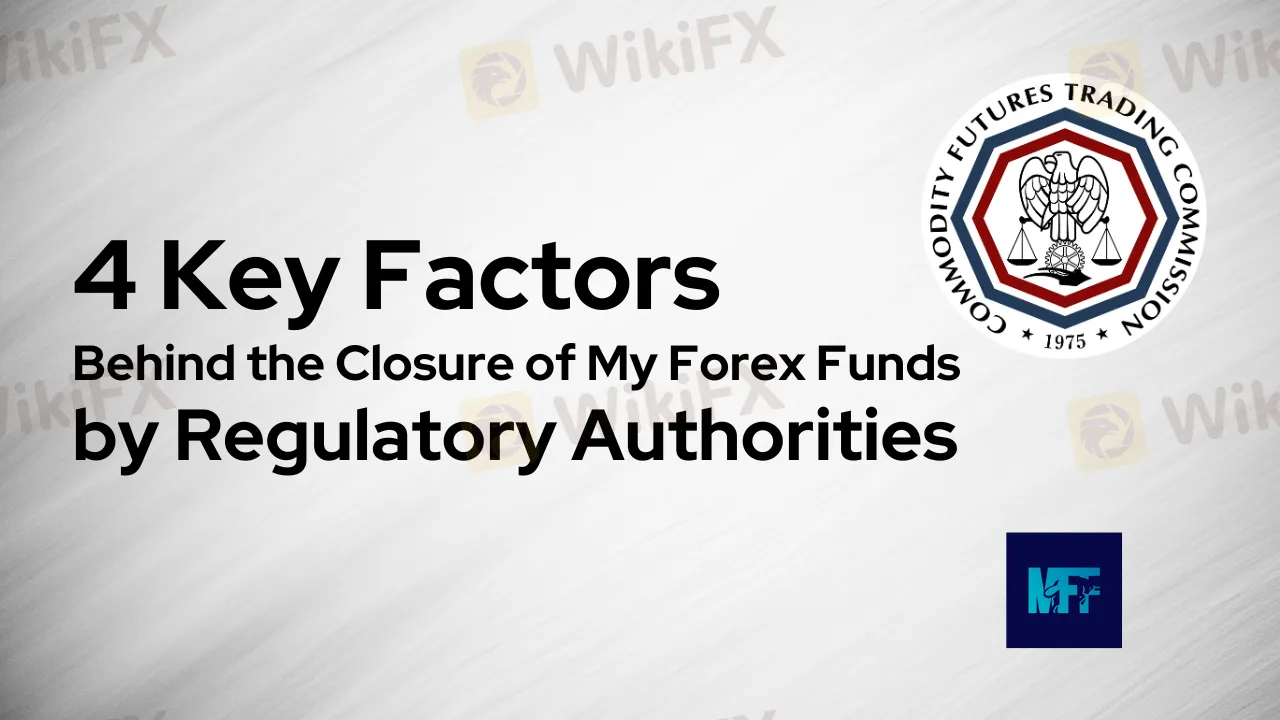简体中文
繁體中文
English
Pусский
日本語
ภาษาไทย
Tiếng Việt
Bahasa Indonesia
Español
हिन्दी
Filippiiniläinen
Français
Deutsch
Português
Türkçe
한국어
العربية
4 Key Factors Behind the Closure of My Forex Funds by Regulatory Authorities
Abstract:CFTC-led shutdown of My Forex Funds, citing misrepresentation, unfair account terminations, deceptive charges, and manipulative trading practices, impacting the prop trading industry and emphasizing regulatory integrity.

The prop trading sector was thrown into disarray on September 1st when the Commodity Futures Trading Commission (CFTC) announced the closure of My Forex Funds by US and Canadian authorities. This judgment has sent shockwaves across the business, emphasizing the need for strong regulatory monitoring.
Four Key Reasons for Shutdown
The CFTC outlined four critical reasons for this decisive action:
Misrepresentation in Profit Sharing: My Forex Funds falsely promised clients profit sharing with third-party liquidity providers, while in reality, they were the counterparty in almost all customer trades.
Account Termination Pretexts: The firm used dubious reasons to terminate customer accounts, often accusing traders of rule violations.
Deceptive Commission Charges: Traders faced misleading commission charges that eroded their account equity.
Manipulative Trade Execution Software: A specialized software was employed to execute customer orders at unfavorable prices, reducing client profits and amplifying losses.
Statement from CFTC
In a stern response, the CFTC has filed a complaint against Murtuza Kazmi and his companies, including Traders Global Group Inc., for fraudulently soliciting customers in retail forex and leveraged commodity transactions. The US District Court has frozen the defendants' assets, with further legal proceedings scheduled.

Case Background
My Forex Funds, under the guise of offering professional trading opportunities, actively worked against its clientele. Over 135,000 customers, since November 2021, have been lured into paying substantial fees, contributing to over $310 million in revenue for the defendants. The complaint highlights the extravagant personal gains Kazmi made from these deceptive practices.
Complementing the CFTC's efforts, the Ontario Securities Commission has issued a temporary cease trade order against Traders Global Group Inc. and Murtuza Kazmi, marking a significant cross-border regulatory collaboration.
This incident casts a spotlight on the prop trading industry, underscoring the necessity for tighter regulatory scrutiny. The clampdown could prompt a strategic shift in the industry, with firms potentially relocating to jurisdictions with more lenient regulations. However, this also signals a move towards greater transparency and honesty in trading operations.
The Role of CFTC
The Commodity Futures Trading Commission (CFTC) is a key player in the financial regulatory landscape of the United States. It is mainly responsible for regulating the futures and options markets as an autonomous governmental body. Its establishment in 1974 was a watershed moment in the formalization of commodities trading structure and governance.

The aim of the CFTC is to promote open, transparent, competitive, and financially sound markets. To that end, it works tirelessly to safeguard market participants and the general public from fraud, manipulation, and abusive activities involving derivatives and other instruments governed by the Commodity Exchange Act. The regulator is also responsible for promoting market integrity and ensuring that businesses follow the legislative and regulatory regulations that regulate commodities trading.
The role of a CFTC regulator encompasses various key functions. These include the formulation and enforcement of rules that aim to prevent excessive speculation, monitoring market activities for signs of manipulation, and taking action against illegal practices like fraud or insider trading. The CFTC also provides educational resources to help the public understand these complex markets.
Bottom line
The shutdown of My Forex Funds serves as a cautionary tale in the financial trading sector. It underscores the critical role of regulatory bodies in safeguarding market integrity and protecting consumer interests. As the industry navigates this challenging period, the emphasis on ethical practices and stringent compliance with regulatory standards becomes more crucial than ever.

Disclaimer:
The views in this article only represent the author's personal views, and do not constitute investment advice on this platform. This platform does not guarantee the accuracy, completeness and timeliness of the information in the article, and will not be liable for any loss caused by the use of or reliance on the information in the article.
Read more

President of Liberland Vít Jedlička Confirms Attendance at WikiEXPO Hong Kong 2025
Vít Jedlička, President and Founder of the Free Republic of Liberland, has confirmed his participation in WikiEXPO Hong Kong 2025, one of the most influential Fintech summits in the industry. The event will bring together global leaders, innovators, and policymakers to delve into the future convergence of technology and society.

Do This ONE Thing to Transform Your Trading Performance Forever
The story is all too familiar. You start trading with high hopes, make some quick profits, and feel like you've finally cracked the code. But then, just as fast as your gains came, they disappear. Your account balance dwindles, and soon you’re left wondering what went wrong. Worse still, fear and confusion creep in, making every new trade a stressful gamble rather than a calculated decision. If this cycle sounds familiar, you’re not alone.

Could Japan Move Away from Ultra-Low Rates?
Japan's Interest Rate Hike: Is the Era of Ultra-Low Rates Over?

Fed Rate Cut Expectations Lowered
Federal Reserve officials have adjusted their rate cut expectations, now anticipating only one rate cut this year instead of the previously expected two.
WikiFX Broker
Latest News
Forex Market Outlook: Key Currency Pairs and Trading Strategies for March 24–28, 2025
Singapore Police Crack Down on Scams: $1.9M Seized, 25 Arrested
Gold Prices Swing Near Record Highs
XTB Opens New Dubai Office
Africa Cybercrime Bust: Over 300 Arrested in Fraud Crackdown
The Growing Threat of Fake Emails and Phishing Scams
Hong Kong Banks and Authorities Collaborate to Freeze Fraudulent Accounts Faster
SocialFi and the Forex Market: A New Era for Decentralized Social Trading?
Is Billion Bucks Fx Scam?
BaFin Halts USDe Token Issuance, Citing Serious Compliance Failures
Currency Calculator







